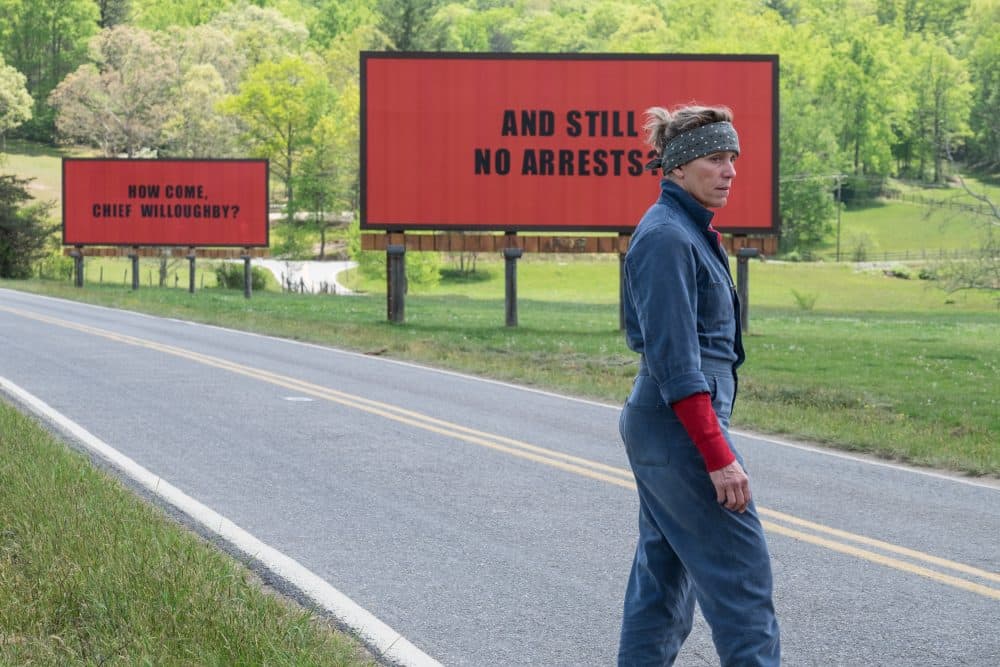Advertisement
Commentary
Why 'Three Billboards' Doesn't Add Up

On Sunday, "Three Billboards Outside Ebbing, Missouri" took home the top Golden Globe of the night, Best Motion Picture for Drama. As much as I enjoy seeing one of my favorite playwrights, the film’s writer and director Martin McDonagh, get recognized for his quirky genius, “Three Billboards,” I fear, is hollow at its center.
The Hollywood Foreign Press was justified in giving acting awards to Frances McDormand and Sam Rockwell, and certainly the film’s overall look and feel speak to McDonagh’s growing skill as a filmmaker. However, “Three Billboards” is like a five-course meal with the final dish missing. As those who don’t mind speaking in the abstract might say, “Ultimately, there’s no there there.”
The film tells the story of Mildred Hayes, who feels the local police have let her down in failing to find the parties responsible for the rape and murder of her daughter, Angela. After seven months of waiting for a break in the case, she decides the local cops need a little nudging. She rents a cluster of three billboards on a quiet roadway near her home. They say: “Raped while dying,” “And still no arrests?” and “How come, Chief Willoughby?”
This understandably strains the relationship between Mildred and the local police, who are overseen by Sheriff Bill Willoughby, played by the reliably great Woody Harrelson. What ensues is a war of sorts. McDonagh’s story attempts to undermine Mildred’s self-righteous position by revealing that the good sheriff is dying of pancreatic cancer. She doesn’t give an inch, and viewers may find themselves trying to deal with the conundrum of who to root for. Likewise, the film wants us to ultimately embrace Rockwell’s character: a drunk, angry racist cop.
This all creates tension aplenty, which McDonagh is the master of, especially in the nine plays he’s written to date, as well as his feature film debut in 2008, the hilarious “In Bruges,” and his 2004 short film, “Six Shooter,” which earned an Academy Award.
So, what goes wrong with “Three Billboards”? On a superficial level, McDonagh loses control of his story. Slight spoiler alert here: having Mildred tossing explosives at the police station in the film's final reel (and getting away with it!) stretches credulity. Meanwhile, Rockwell’s disgraced cop’s attempt to nab a man he suspects of Angela’s murder, not by simply jotting down his license plate number as he could have, but by drawing him into a bar fight so he can have the man’s DNA tested via the blood that Rockwell's character gets on his own wounds.
But beyond this, other than the doomed sheriff, I had no empathy for the characters of “Three Billboards.” I found myself not caring about Mildred’s plight, left only to enjoy McDormand’s angry swagger and the nasty bits of dialogue McDonagh gives her. Angela, the victim in all this, is not a delineated character we might actually mourn the passing of, but the one time we see her, in a short flashback, she’s the personification of a teenage witch, and I don’t mean a charming one like Sabrina.
Advertisement
Thinking about the characters in the film, I’m reminded of a review of the 1976 film “Two-Minute Warning,” in which a gunman opens fire on a stadium during a football game. The characters in that movie were so unlikable, the critic quipped that audiences couldn’t be blamed if they began rooting for the sniper.
Or maybe the reason I feel let down by the film is that there were no possible winners in this story. But instead of having the vision and courage to let that be the overall, albeit bleak, message of the film, McDonagh creates an uncharacterstic Hollywood ending (spoiler coming) of having two characters who’ve spent the past 90 minutes or so hating each other suddenly riding off into the sunset toward a sunnier horizon. Forgiveness abounds, and love may even be in the air. I didn’t feel tingles; I felt empty. For those who know McDonagh's other work, this denouement is out of character.
Some film critics have addressed the film's primary shortcoming, saying its reach is greater than its grasp, and that it’s an inspired effort that doesn’t quite reach the goal. Kudos all around, for the great acting, and for McDonagh’s direction that earned two of his stars Golden Globes and probably future awards. His mise en scène, dark comedy and ability to put a knot in our collective stomachs, indicate he’s got the goods as director and writer (the screenplay also won a Golden Globe Sunday night).
I’d still recommend people see the film. Too bad it simply adds up to less than what it might have been and to what award shows will tell you it is.
This article was originally published on January 08, 2018.
